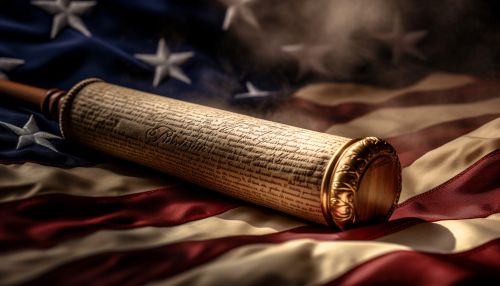Fifth Amendment to the United States Constitution
Overview
The Fifth Amendment to the United States Constitution is a part of the Bill of Rights, the first ten amendments to the U.S. Constitution. Ratified in 1791, the Fifth Amendment provides several protections for individuals against abuse of government authority in legal proceedings. These protections include the right to a grand jury, protection against double jeopardy, the prohibition of self-incrimination, and the guarantee of due process of law.


Text
The text of the Fifth Amendment reads: "No person shall be held to answer for a capital, or otherwise infamous crime, unless on a presentment or indictment of a Grand Jury, except in cases arising in the land or naval forces, or in the Militia, when in actual service in time of War or public danger; nor shall any person be subject for the same offence to be twice put in jeopardy of life or limb; nor shall be compelled in any criminal case to be a witness against himself, nor be deprived of life, liberty, or property, without due process of law; nor shall private property be taken for public use, without just compensation."
Grand Jury Requirement
The Fifth Amendment requires that serious criminal charges must be started by a grand jury. A grand jury is a group of citizens called to review evidence and determine whether there is sufficient evidence to charge a person with a crime. This requirement is designed to protect individuals from unfounded criminal prosecutions.
Double Jeopardy Protection
The Double Jeopardy Clause of the Fifth Amendment provides that no person shall "be subject for the same offence to be twice put in jeopardy of life or limb." This means that a person cannot be tried again for the same crime once they have been acquitted, and they cannot be punished twice for the same offense.
Self-Incrimination Protection
The Fifth Amendment protects individuals from being compelled to be witnesses against themselves in criminal cases. This protection against self-incrimination means that the government cannot force individuals to testify against themselves or provide evidence that could lead to their own conviction.
Due Process
The Fifth Amendment guarantees that the government cannot deprive individuals of "life, liberty, or property, without due process of law." This Due Process Clause ensures that individuals have a fair procedure before being deprived of their rights. It applies to all government proceedings, not just criminal trials, and includes the right to notice and an opportunity to be heard.
Eminent Domain
The final clause of the Fifth Amendment, often referred to as the Takings Clause, provides that "private property [shall not] be taken for public use, without just compensation." This clause, which guarantees the right of eminent domain, ensures that when the government takes private property for public use, it must provide just compensation to the owner of the property.
